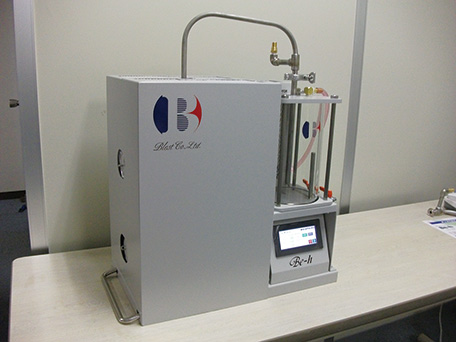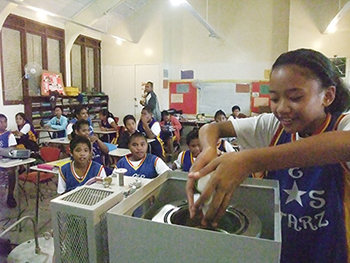Master Techniques, From Japan to the World 3
Raising Awareness about Recycling with Popcorn Machines
- Trials of a System for Converting Waste Plastics into Oil in Palau

A desktop-type waste plastic-to-oil system. (Photo: Blest Co., Ltd.)
The Republic of Palau is an archipelago in the Pacific Ocean with 20,000 inhabitants. Some 120,000 tourists, which is six times Palau’s population, visit the country to experience its natural beauty every year. However, tourists and locals alike have produced a large amount of waste in recent years. This waste has begun damaging the islands’ natural beauty and has become a serious environmental issue.
The Government of Japan provided the state of Koror in Palau with assistance to build a recycling center in 2007 to recycle cans, bottles and PET bottles. On the other hand, waste plastics, such as food trays, account for about one-third of the country’s annual waste, or roughly 2,000 tons. Nearly all of this plastic is disposed of in a landfill. Palau is a small country and has very limited space for landfills. Palau’s beautiful natural surroundings are the country’s main tourism resource, and it is essential to recycle waste plastics and reduce waste in order to protect these surroundings.
Blest Co., Ltd. is a company located in Hiratsuka City, Kanagawa Prefecture that develops and sells systems that convert waste plastics into oil. The company learned about the challenges faced by Palau and responded by initiating a Feasibility Survey with the Private Sector for Utilizing Japanese Technologies in ODA Projects1 under JICA’s Partnership with Japanese Small and Medium-sized Enterprises (SMEs)2 in August 2013. The purpose of the survey was to examine whether Blest’s technologies could help to solve the issue of waste plastics in Palau.
Oiling technology is a process that converts waste plastics into oil, and is a common method of recycling waste plastics. This involves a distillation process whereby waste plastics are heated at high temperature. This vaporizes the oil components, then cools them into a liquid. However, until now, facilities using this technology could only start the oiling process when the plastics had been strictly separated by type. This was a problem because it was very costly to establish a sorting system and source the manpower. Therefore, Palau found it difficult to build such a facility and system.
Blest brought a desktop small-scale waste plastic oiling system developed in-house to Palau to conduct test operations. This system is portable and runs on 100 volts, which is the same voltage used in homes. It mainly processes plastic that is typically thrown out as household garbage, such as plastic bags, candy wrappers, food trays, drinking cups, and plastic utensils. The system does not require sorting or manpower, so it cuts down on costs. In addition, another technical advantage is that it does not use a conventional burner. Instead, the system employs an electric heater that maintains a stable heating temperature and can vaporize plastics at the correct temperature.
Blest has used this desktop small-scale waste plastic oiling system to conduct a “School Oil Field Class” at schools in Palau. This class demonstrates the oil conversion process of waste plastics. During the class, instructors use Blest’s small-scale waste plastic oiling system on plastics that are normally thrown away, and converts them into oil. This oil is then used by a generator to power a popcorn machine. While enjoying delicious popcorn, students learn that they can recycle waste plastics that are typically thought of as trash, and turn them into a useful resource.

Local children learn firsthand about the oil conversion process of waste plastics at a School Oil Field Class. (Photo: Blest Co., Ltd.)
An elementary school where this class was held has set up a collection box called “School Oil Field.” Students correctly sort waste plastics from their home and neighborhood, and then place them inside the collection box. This has inspired children to raise awareness about plastic sorting among their own families, which has in turn spread the practice of sorting and collecting in the community.
Mr. Akinori Ito, President of Blest Co., Ltd., says, “Recycling waste is not possible without the community’s participation. Just like the School Oil Field Class, it’s important to start from small scope and scale up a recycling movement until it becomes a daily practice.”
Thanks to the results of these efforts, JICA’s Verification Survey with the Private Sector for Utilizing Japanese Technologies in ODA Projects3 was initiated in the state of Koror and now an industrial large-scale waste plastic oiling system will be installed. This project will seek to supply 100% of the electricity used by the offices of the state of Koror government, using recycled fuel produced from this waste plastic oiling system. The state of Koror also enacted a new recycling ordinance, which encourages local residents to participate more actively in recycling activities. “The goal of this project is to supply part of the electricity needed by the state of Koror. However, there is such a large volume of waste plastics that this facility could potentially supply a major portion of the state’s electricity in the future,” says Mr. Ito.
Until now Palau has relied heavily on high-cost oil imports for its electricity needs. There are now high hopes that a Japanese SME’s technologies can advance waste plastics recycling, realize lower cost electricity supply, and help to conserve the beautiful natural environment of Palau.
*1 A survey on the feasibility of using a certain product or technology for the development of a developing country based on a proposal from a Japanese SME.
*2 Projects aiming to achieve both the development of developing countries and the activation of the Japanese economy by utilizing Japanese SME’s excellent products and technologies through ODA.
*3 A survey to verify ways to enhance a product and technology’s compatibility with a developing country and thereby disseminate the product and technology, based on a proposal from a Japanese SME.
<< Previous Page Next Page >>
Main Text | Statistics and Reference Materials | Stories from the field | Master Techniques, From Japan to the World | ODA Topics | A Journalist’s Perspective on Japan’s ODA
